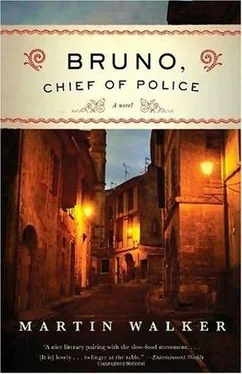Martin Walker - Bruno, chief of police
Здесь есть возможность читать онлайн «Martin Walker - Bruno, chief of police» весь текст электронной книги совершенно бесплатно (целиком полную версию без сокращений). В некоторых случаях можно слушать аудио, скачать через торрент в формате fb2 и присутствует краткое содержание. Жанр: Полицейский детектив, на английском языке. Описание произведения, (предисловие) а так же отзывы посетителей доступны на портале библиотеки ЛибКат.
- Название:Bruno, chief of police
- Автор:
- Жанр:
- Год:неизвестен
- ISBN:нет данных
- Рейтинг книги:3 / 5. Голосов: 1
-
Избранное:Добавить в избранное
- Отзывы:
-
Ваша оценка:
- 60
- 1
- 2
- 3
- 4
- 5
Bruno, chief of police: краткое содержание, описание и аннотация
Предлагаем к чтению аннотацию, описание, краткое содержание или предисловие (зависит от того, что написал сам автор книги «Bruno, chief of police»). Если вы не нашли необходимую информацию о книге — напишите в комментариях, мы постараемся отыскать её.
Bruno, chief of police — читать онлайн бесплатно полную книгу (весь текст) целиком
Ниже представлен текст книги, разбитый по страницам. Система сохранения места последней прочитанной страницы, позволяет с удобством читать онлайн бесплатно книгу «Bruno, chief of police», без необходимости каждый раз заново искать на чём Вы остановились. Поставьте закладку, и сможете в любой момент перейти на страницу, на которой закончили чтение.
Интервал:
Закладка:
Through ice ages and warming periods, floods and wars and famine, people had lived here for forty thousand years. Bruno, who reminded himself that there were still many caves and paintings that he really ought to visit, felt deep in his heart that he understood why.
Down at the riverbank, he saw that the mad Englishwoman was watering her horse after her morning ride. As always, she was correctly dressed in gleaming black boots, cream jodhpurs and a black jacket. Her auburn hair flared out behind her neat black riding hat like the tail of a fox. Idly, he wondered why they called her mad. She always seemed perfectly sane to him, and appeared to make a good business of running her small guest house. She even spoke comprehensible French, which was more than could be said of most of the English who had settled here.
He looked further up the road that ran alongside the river, and saw several trucks bringing local farmers to the weekly market. It would soon be time for him to go on duty. He took out the one item of equipment that never left his side, his cell phone, and dialled the familiar number of the Hфtel de la Gare.
‘Any sign of them, Marie?’ he asked. ‘They hit the market at St Alvиre yesterday so they are in the region.’
‘Not last night, Bruno. Just the usual guys staying from the museum project and a Spanish truck driver,’ replied Marie, who ran the small hotel by the station.
‘But remember, after last time they were here and found nothing, I heard them talking about renting a car in Pйrigueux to put you off the scent. Bloody Gestapo!’
Bruno, whose loyalty was to his local community and its mayor rather than to the nominal laws of France, particularly when they were really laws of Brussels, played a constant cat-and-mouse game with the inspectors from the European Union who were charged with enforcing EU hygiene rules on the markets of France.
Hygiene was all very well, but the locals of the Commune of St Denis had been making their cheeses and their pвtй de foie gras and their rillettes de porc for centuries before the EU was even heard of, and did not take kindly to foreign bureaucrats telling them what they could and could not sell. Along with other members of the Police Municipale in the region, Bruno had established a complex early warning scheme to alert the market vendors to their visits.
The inspectors, known as the Gestapo in a part of France that had taken very seriously its patriotic duties to resist the German occupation, had started their visits to the markets of Pйrigord in an official car with red Belgian licence plates. On their second visit, to Bruno’s alarm, all the tyres had been slashed. Next time they came in a car from Paris, with the telltale number ‘75’ on the licence plate. This car too had been given the Resistance treatment, and Bruno began to worry whether the local counter-measures were getting out of hand. He had a good idea who was behind the tyre-slashing, and had issued some private warnings that he hoped would calm things down. There was no point in violence if the intelligence system could ensure that the markets were clean before the inspectors arrived.
Then the inspectors had changed their tactics and come by train, staying at local station hotels. But that meant they were easily spotted by the hotel keepers who all had cousins or suppliers who made the crottins of goat cheese and the foie gras, the home-made jams, the oils flavoured with walnuts and truffles, and the confits that made this corner of France the very heart of the nation’s gastronomic culture. Bruno, with the support of his boss, the Mayor of St Denis, and all the elected councillors of the Commune, even Montsouris the Communist, made it his duty to protect his neighbours and friends from the idiots of Brussels. Their idea of food stopped at moules and pommes frites, and even then they adulterated perfectly good potatoes with an industrial mayonnaise that they did not have the patience to make themselves.
So now the inspectors were trying a new tack, renting a car locally so that they might more easily stage their ambush and subsequent getaway with their tyres intact. They had succeeded in handing out four fines in St Alvиre yesterday, but they would not succeed in St Denis, whose famous market went back more than seven hundred years. Not if Bruno had anything to do with it.
With one final gaze into the little corner of paradise that was entrusted to him, Bruno took a deep breath of his native air and braced himself for the day.
As he climbed back into his van, he thought, as he always did on fine summer mornings, of a German saying some tourist had told him: that the very summit of happiness was ‘to live like God in France’.
CHAPTER 2
Bruno had never counted, but he probably kissed a hundred women and shook the hands of at least as many men each morning on market day. First this morning was Fat Jeanne, as the schoolboys called her. The French, who are more attuned to the magnificent mysteries of womanhood than most, may be the only people in the world to treasure the concept of the jolie laide, the plain or even ugly woman who is so comfortable within her own ample skin and so cheerful in her soul that she becomes lovely. And Fat Jeanne was a jolie laide of some fifty years and almost perfectly spherical in shape. She was not a beauty by any stretch of the imagination, but a cheerful woman at ease with herself. The old brown leather satchel in which she collected the modest fees that each stall holder paid for the privilege of selling in the market of St Denis thumped heavily against Bruno’s thigh as Jeanne, squealing with pleasure to see him, turned with surprising speed and proffered her cheeks to be kissed in ritual greeting. Then she gave him a fresh strawberry from Madame Verniet’s stall, and Bruno broke away to kiss the roguish old farmer’s widow on both wizened cheeks in greeting and gratitude.
‘Here are the photos of the inspectors that Jo-Jo took in St Alvиre yesterday,’
Bruno said to Jeanne, taking some printouts from his breast pocket. He had driven over to his fellow municipal policeman the previous evening to collect them. They could have been emailed to the Mairie’s computer, but Bruno was a cautious man and thought it might be risky to leave an electronic trail of his discreet intelligence operation.
‘If you see them, call me. And give copies to Ivan in the cafй and to Jeannot in the bistro and to Yvette in the tabac to show their customers. In the meantime, you go that way and warn the stall holders on the far side of the church. I’ll take care of the ones towards the bridge.’
Every Tuesday since the year 1346, when the English had captured half the nobility of France at the Battle of Crйcy and the grand Brillamont family had to raise money to pay the ransom for their Seigneur, the little Pйrigord town of St Denis has held a weekly market. The townspeople had raised the princely sum of fifty livres of silver for their feudal lord and, in return, they secured the right to hold the market on the canny understanding that this would guarantee a livelihood to the tiny community, happily situated where the stream of Le Mauzens ran into the river Vйzиre – just beyond the point where the remaining stumps of the old Roman bridge thrust from the flowing waters. A mere eleven years later, the chastened nobles and knights of France had once again spurred their lumbering horses against the English archers and their longbows and had been felled in droves. The Seigneur de Brillamont had to be ransomed from the victorious Englishmen all over again after the Battle of Poitiers, but by then the taxes on the market had raised sufficient funds for the old Roman bridge to be crudely restored. So, for another fifty livres, the townsfolk bought from the Brillamont family the right to charge a toll over the bridge and their town’s fortunes were secured forever.
Читать дальшеИнтервал:
Закладка:
Похожие книги на «Bruno, chief of police»
Представляем Вашему вниманию похожие книги на «Bruno, chief of police» списком для выбора. Мы отобрали схожую по названию и смыслу литературу в надежде предоставить читателям больше вариантов отыскать новые, интересные, ещё непрочитанные произведения.
Обсуждение, отзывы о книге «Bruno, chief of police» и просто собственные мнения читателей. Оставьте ваши комментарии, напишите, что Вы думаете о произведении, его смысле или главных героях. Укажите что конкретно понравилось, а что нет, и почему Вы так считаете.












